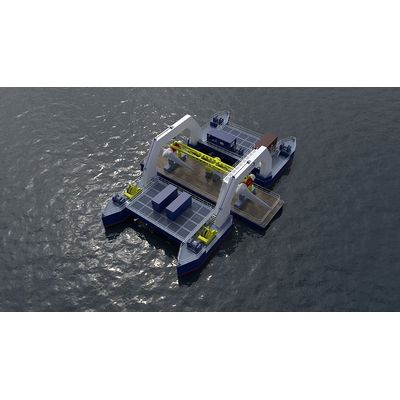

- Home
- Companies
- HydroWing Ltd
- Products
- HydroWing - Tidal Device

HydroWing - Tidal Device
The tidal industry has struggled to drive down its Levelized Cost of Energy since its birth over a decade ago, preventing it from becoming competitive and thriving within the renewable energy market. The two main issues lie in turbine complexity and reliability and expensive offshore maintenance.
The engineering drive to optimise energy extraction has led to many developers employing complex systems to increase output which has seen them encounter issues with device reliability. Reduced reliability results in increased down time and loss of revenue. To add to these associated costs the requirement of large and specialised vessels has incurred cripplingly high costs on developers.
The HydroWing solution combats these issues via a holistic and simplistic approach which reduces the cost, improves reliability and saves time and effort of O&M.
The HydroWing is a modular, multi-rotor tidal energy device with two main components.
Utilises Tocardo’s industry-leading bi-directional blades
Builds on Tocardo’s proven reliability and track record
Delivers increased yield through Tocardo’s patented passive pitch system
Blade passively pitches 180 degrees to face incoming tide, increasing efficiency
Forces passively pitch blades at high flows, significantly reducing loads and enabling larger blades with +50% yield
Instantaneous subsea electrical connector
Single centralised control hub
Single export cable
HydroWing permits a high packing density for arrays, maximising site energy yield
Patented modular design unlocks low-cost recovery for through life maintenance and easier in-field accessibility
Vertical launch and recovery corridors help to simplify maintenance
Reduced cost and greater reliability of non-yawing and bi-directional turbines
Turbines constructed from reliable off the shelf components enabling wide supply chain and reduced lead times to be accessed
Multiple turbines enable maintained power production in the event of individual failure
Support structure constructed from standard cross sections
Smaller turbines (5-10m diameter), reduce wake effects enabling increased power density and revenue potential of sites
Small turbines distribute loads evenly through support structure prolonging fatigue life.
